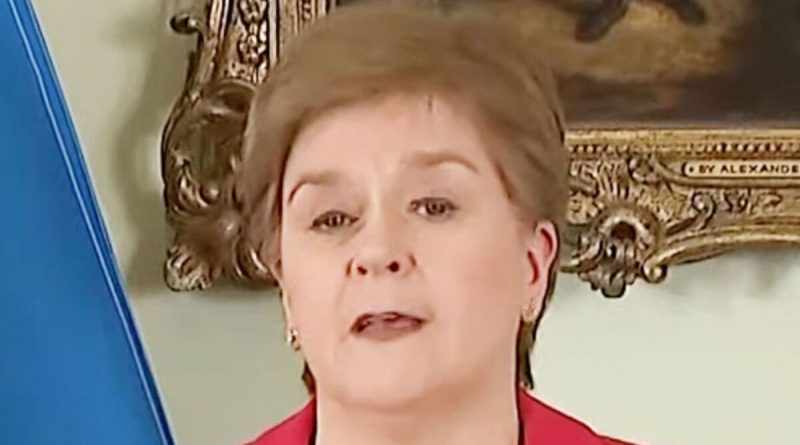Sturgeon could exploit ‘advisory’ vote to push through independence
IndyRef2: Expert warns Sturgeon could exploit advisory referendum
We use your sign-up to provide content in ways you’ve consented to and to improve our understanding of you. This may include adverts from us and 3rd parties based on our understanding. You can unsubscribe at any time. More info
Nicola Sturgeon’s SNP could force through a second independence referendum by replicating the Brexit model and imposing the referendum’s results on Westminster, a constitutional expert said. The Scottish First Minister is now hoping for the Supreme Court to rule in her favour and rule an advisory referendum on Scottish independence can be legally held. In the same way Boris Johnson’s Government made the Brexit advisory vote a reality, Ms Sturgeon could push independence over the line with a yes vote from the Scottish people.
When asked if Nicola Sturgeon’s SNP could use that same strategy, Prof Aileen McHarg told Express.co.uk: “I think there is the risk of that.
“Certainly, unionists have argued and are still arguing that even if the Supreme Court says this referendum is within the competence of the Scottish Parliament and can go ahead that they’ll boycott it and simply refuse to engage.
“If you get a referendum result that is overwhelmingly supportive of independence, then yes but in circumstances where the turnout is very low, then you know that voters have boycotted it.
“That significantly reduces its political authority. So, this argument of ‘we will ignore this’ are already being made. Not terribly helpful for the UK Goverment’s argument in court because one of the oddities of this case is the UK and the Scottish Government could have to argue for the effect of the referendum being the opposite of what it intended to be.”


In 2017, the Supreme Court ruled in the Miller case that the Brexit vote in and of itself did not constitute a sufficient ground to trigger Article 50 to leave the European Union. Then Prime Minister Theresa May was forced to pass the European Union Act in 2017 through Parliament to trigger article 50 and start Brexit talks with the EU.
Pr McHarg said: “One of the things that was emphasised in the first Miller case back in 2017 was that did not in itself trigger the UK’s withdrawal from the EU.
“There had to be another act of the UK Parliament to authorise that withdrawal, so in that case, they drew that distinction between the legal effect and the political effect.
“And by saying that there had to be another legal step, we know that the majority of MPs voted to leave the EU – but they did not all.
“There wasn’t a pure formality that that would happen, that we would leave the EU.”


Prof McHarg said: “By sending the issue back to Parliament, there was then the scope for MPs and Peers to vote against it under certain terms and conditions.
“In the end, none of that happened but it could’ve happened. By adding that extra step, it did leave the possibility that the EU’s referendum results would have been void.
“Even after we triggered article 50, we had years of people trying to still stop Brexit to say we needed another referendum. There was the Wightman case when we went to the European Court of Justice and asked: ‘Can we cancel article 50 notification?’
“So, the result of that referendum was in no way self-executing. Even though ultimately it prevailed, not everybody thought that it should and lots of people tried to stop it.”
DON’T MISS:
Sturgeon slammed for falling ‘far behind’ Wales in replacing Erasmus [REPORT]
‘Guardian of the union’ Sunak to slap down Sturgeon’s indy plan [REPORT]
Sturgeon forced to delete message to Rishi Sunak after awkward gaffe [REPORT]

Prof McHarg argued Nicola Sturgeon could adopt the same strategy, meaning she could drive through a bill through Parliament – like Theresa May did in 2017 – after a yes vote and get independence.
However, the outcome of a Scottish referendum remains unclear with half the Scottish people against independence. According to a polls aggregate conducted by The Herald newspaper, the yes vote only had a lead at the beginning of the year, with the no vote consistently winning by a razor-thin margin since.
Professor Sir John Curtice, one of the authors of the social attitudes survey, said the Scottish people’s vote to remain in the EU in the 2016 Brexit referendum has made the Union “decidedly less popular north of the border”.
If the Supreme Court rules in the SNP’s favour, Nicola Sturgeon said a vote will be held on October 19, 2023.
READ NEXT:
Sturgeon unveils Indy masterplan to harness ‘greatest opportunity’
Sturgeon’s ‘advisory’ IndyRef2 could backfire in Catalonia-style chaos
Sturgeon handed major boost as Westminster exhausting IndyRef2 case
SNP’s IndyRef2 demands savaged as BBC audience member erupts
Sturgeon in swipe at Tories after Truss ‘never’ spoke to her
Source: Read Full Article

